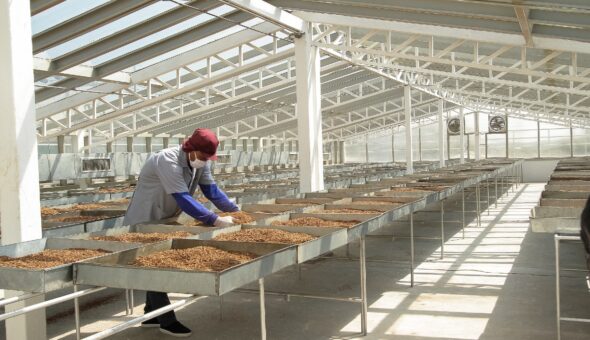With tobacco killing one in two of its users, it’s little wonder that a major focus for tobacco control advocacy is on health. But while tobacco products appear near the end of a long and complex supply chain, its harms start at the very beginning, with tobacco leaf farming.
About tobacco farming
Tobacco is grown in over 124 countries across the world, with production increasingly shifting to low- and middle-income countries. According to data from the World Health Organization (WHO), from 2005 to 2020, the area under tobacco cultivation decreased globally by 15.8%, while in Africa it increased by 19.8%. Myths abound about the benefits of tobacco farming to economies and communities, many of them perpetuated by the tobacco industry. The reality is that tobacco farming is harmful to economies, the environment, and above all to farmers and their families.
- Tobacco farming isn’t always profitable for farmers
The tobacco industry promises high rates of return for investing in tobacco crops and long-term benefits to smallholder farmers who cultivate tobacco. In fact, tobacco growing is often less profitable for farmers than other crops, and tobacco-growing families are poorer than comparable non-tobacco-growing households.
Many tobacco farmers work under a contract system whereby farmers receive loans to buy seedlings, fertiliser and machinery at the start of the season from leaf-buying companies, without having to pay for these upfront. In return, they commit to selling their tobacco to the leaf merchant who then has complete control over how much is paid for it. As a result, contract farmers can become stuck in ‘bonded labour’, where they do not earn enough to repay their loan, or make enough profits to allow them to invest in other crops and move away from tobacco.
- Tobacco farming harms already vulnerable communities
Impoverished and vulnerable communities are not empowered through tobacco farming. Tobacco is a hugely labour intensive crop, leaving little time for education and skills development that might help families find more lucrative and less harmful sources of income. Women often work as primary farm labourers, but they have little financial decision-making power, and are often expected to cover all household chores alongside long hours in the tobacco fields.
- Tobacco farming causes sickness
Unlike food crops, handling tobacco leaf without protective equipment, which can be difficult for farmers to access and use, leads to sickness. WHO estimates that as many as one in four tobacco farmers suffer from Green Tobacco Sickness from nicotine absorption through the skin, which causes nausea, vomiting, dizziness, headaches, increased perspiration, chills, abdominal pain, diarrhoea, weakness and breathlessness. The effects are worse for children because of their small body size and lack of tolerance to nicotine, while women face a higher risk of miscarriage. Tobacco farmers are also exposed to dangerous chemicals and fertilisers. Researchers found that in Kenya, 26% of tobacco workers showed symptoms of pesticide poisoning.
- Tobacco farming is damaging to children
The use of child labour is a longstanding issue in tobacco farming. As of 2018, children were working on farms in virtually all the main tobacco producing countries, including Argentina, Brazil, Indonesia, Malawi and the United States. Involvement in tobacco farming puts children’s health at risk, and limits their access to education.
- Tobacco farming damages the planet
Tobacco farming results in deforestation, soil degradation, biodiversity loss, and pollution of soils and waterways. Tobacco farming accounts for about 5% of total deforestation, and approximately 200,000 hectares of land are cleared for tobacco agriculture and curing each year. Research from Bangladesh, where weedkiller is frequently used in tobacco fields, found that significant levels of chemicals were also detected in local water sources, killing fish and soil organisms needed to maintain soil health.
World No Tobacco Day (WNTD) 2023
Every hectare growing tobacco boosts the profits of the tobacco industry but is unavailable for growing food. The focus for WHO WNTD 2023 is “grow food, not tobacco”. The campaign objectives are to:
- Mobilize governments to end subsidies on tobacco growing and use of savings for crop substitution programmes that support farmers to switch and improve food security and nutrition.
- Raise awareness in tobacco farming communities about the benefits of moving away from tobacco and growing sustainable crops;
- Support efforts to combat desertification and environmental degradation by decreasing tobacco farming;
- Expose industry efforts to obstruct sustainable livelihoods work.
Find out more
For more information and references, please see:
Tobacco Farming, TobaccoTactics
WHO WNTD 2023 report, “Grow food not tobacco”
We discuss tobacco farming in our podcast Deadly Industry: Challenging Big Tobacco - listen here.
Header image: stock photo ID: 1910021986 on Shutterstock


